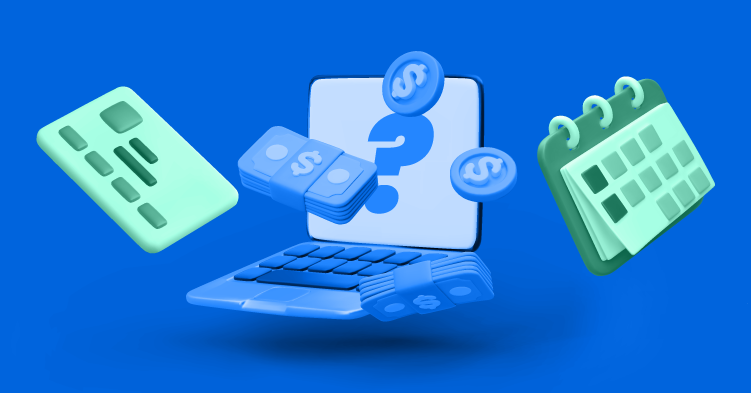Business Term Loan vs. Line of Credit

Running a business often requires access to capital beyond what you might have on hand. You may look into small business loans, such as a business term loan or a business line of credit. In this blog post, we’ll explore the differences between those financial products, their respective pros and cons, and when to consider each loan option.
Business Term Loan vs. Line of Credit: What’s the Difference?
If you’re a small business owner or entrepreneur, it’s important to understand how business term loans and lines of credit work. Then you can understand the difference between these business financing options and ultimately make financial decisions to meet your business needs.
Business Term Loan
With a business term loan, a lump sum of money is borrowed for a specific period, usually with a fixed interest rate. Repayment typically occurs through monthly installments over the loan’s term. This type of loan is typically used for financing large, one-time expenses like equipment purchases or expansion.
Business Line of Credit
A business line of credit generally refers to a revolving credit line that allows you to draw funds as needed, up to a predetermined credit limit. You repay a line of credit by making regular payments against the outstanding balance. Interest is only charged on the amount borrowed. Many small businesses use a line of credit to cover ongoing operational costs or manage cash flow fluctuations.
What Are the Pros and Cons of Business Term Loans?
Pros
Predictable repayments. Due to their fixed repayment schedule (typically monthly payments), it can be easier to budget for your loan payments. This structured approach ensures that you make consistent payments, promoting financial discipline and helping you build a positive credit history. Additionally, it provides a clear path to debt reduction, as you know when the loan will be fully paid off.
Fixed interest rates. Term loans typically offer fixed interest rates. This means that your interest rate remains constant throughout the loan’s term, making it easier to plan for and budget your monthly expenses. In contrast, other forms of financing may have variable interest rates that can change over time, potentially leading to uncertainty in your repayment amounts.
Longer loan terms. Term loans typically offer longer repayment terms compared to other types of financing, such as short-term loans or lines of credit. This can be ideal for businesses that need a significant amount of money to finance larger projects or investments. Longer loan terms can result in lower monthly payments, making it more manageable for your cash flow.
Cons
Rigid repayment schedule. While the structured repayment schedule can be a pro, it can also be a con for some businesses. Monthly payments are typically fixed and must be made on time. This rigidity can put a strain on your cash flow, especially if your business experiences seasonal fluctuations or unexpected financial setbacks. If you miss payments, it could harm your credit score and potentially lead to default.
Longer approval process. Obtaining a business term loan may involve a longer application process and approval timeline. Traditional banks and some financial institutions often have stringent eligibility criteria for term loans. They may require a strong credit history, a track record of profitability and a certain number of years in business. This can make it difficult for newer businesses or those with less-established credit to qualify.
Interest costs over time. While lower interest rates are a benefit of term loans, paying interest over the entire loan term can result in higher overall interest costs compared to shorter-term financing options. If you opt for a longer repayment period, you may end up paying more in interest over the life of the loan.
What Are the Pros and Cons of Business Lines of Credit?
Pros
Flexibility. One of the most significant advantages of a business line of credit is its flexibility. You have access to a predetermined credit limit, but you only borrow and pay interest on the amount you use. You can access funds whenever necessary, making a line of credit helpful for managing working capital and unforeseen business expenses.
Interest on what you use. Lines of credit may have lower interest rates compared to other short-term financing options, such as credit cards or merchant cash advances. In most cases, you only pay interest on the amount you borrow, not the entire credit limit. This can result in lower monthly payments, providing more financial flexibility.
Quick access to funds. A business line of credit is great for addressing short-term cash flow gaps and seasonal fluctuations. Compared to the often lengthy approval process of traditional term loans, lines of credit typically offer quicker access to funds. This availability can be crucial when faced with time-sensitive business opportunities or emergency expenses.
Cons
Variable interest rates. Many business lines of credit come with variable interest rates. While this can mean lower interest rates initially, it also introduces uncertainty. If market interest rates rise, your monthly interest costs will increase, potentially affecting your cash flow.
Potential for overuse. The ease of access to funds with a line of credit can tempt some businesses to overuse the credit line. Excessive borrowing can lead to financial strain and make it challenging to repay the borrowed amount, potentially damaging your creditworthiness.
Maintenance fees. Some lenders may charge annual or monthly fees for maintaining a business line of credit, even if you don’t actively use it. These fees can add to the cost of borrowing, so it’s essential to factor them into your financial planning.
When Should You Use a Business Term Loan?
It always depends on your individual circumstances, but you might consider opting for a business term loan if your business has one of the following needs:
Funding for large investments. Business term loans are particularly well-suited for when you need a significant loan amount upfront for a specific purpose. These often include equipment purchases, real estate acquisitions, renovations and expansions.
Fixed project costs. Business term loans offer predictability in terms of monthly payments, making it easier to budget for specific projects or investments. This predictability allows you to allocate resources efficiently and plan for the loan’s repayment within your financial projections.
Debt consolidation. If your business has multiple high-interest loans or outstanding debts, a business term loan can be used to consolidate these debts into a single loan with a potentially lower interest rate and more manageable monthly payments. Debt consolidation can streamline your finances and reduce interest costs over time.
When Should You Use a Business Line of Credit?
It depends on your circumstances, but you might consider a business line of credit if your business has one of these needs:
Managing seasonal fluctuations. Many businesses experience seasonal variations in cash flow, with periods of high demand and revenue followed by slower times. A business line of credit is invaluable for smoothing out these cash flow fluctuations. During peak seasons, you can draw on the credit line to cover increased operational expenses or inventory purchases, and during slower times, you can use it to bridge revenue gaps.
Covering short-term expenses. Lines of credit are ideal for addressing short-term financial needs, such as covering payroll, paying suppliers or handling unexpected expenses like repairs or maintenance. Instead of depleting your cash reserves or disrupting your operations, you can access funds quickly and efficiently.
Scaling up. When your business experiences growth, whether through increased demand or expansion into new markets, you may require additional working capital to support the growth trajectory. A line of credit can provide the necessary funding to hire new staff, invest in marketing or expand your facilities, helping your business scale smoothly.
Can You Have a Business Term Loan and a Business Line of Credit at the Same Time?
Yes, subject to your ability to qualify for both at the same time, you can have both a business term loan and a business line of credit simultaneously. In fact, some businesses find this strategy advantageous. They use the term loan for long-term investments while relying on the line of credit for short-term working capital needs, ensuring that all repayment scenarios are well within the business’s financial means.
Where Can You Get Business Term Loans and Lines of Credit?
Traditional banks and credit unions. Established banks offer business loan products, but they often have stringent approval criteria and longer processing times. Credit unions may provide a competitive and more personalized approach to lending.
Online lenders. Online lending platforms have gained popularity for their speed and accessibility. They cater to a wide range of businesses, including those with less-established credit histories. Some online lenders report positive lending behavior to business credit bureaus, so you can build business credit history.
Small Business Administration (SBA). While technically not a lender, the SBA offers government-backed programs designed to support small businesses. However, SBA loan guarantees often involve a more extensive and lengthy approval process, making it more difficult to get business funding quickly.
This content is for educational and informational purposes only, and is not intended as financial, investment or legal advice.




